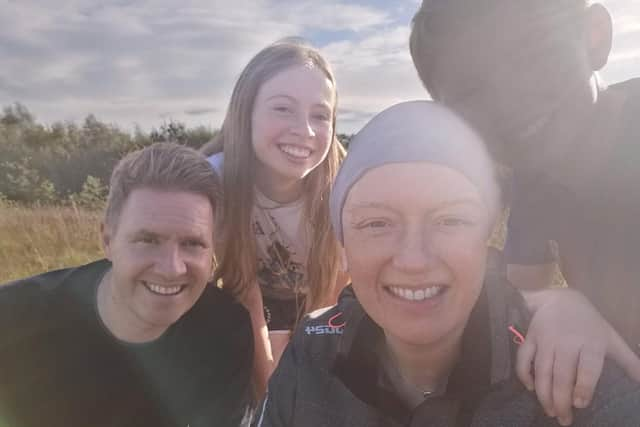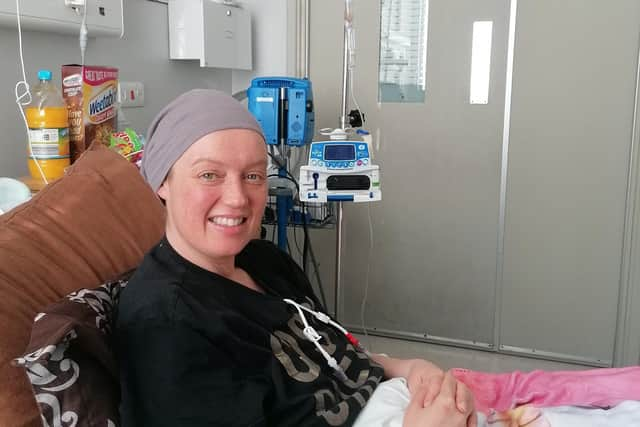Mother-of-two to spend Christmas with her family after stem cell transplant
Last year 40 year old English teacher Emma Leeming thought it was normal that she felt tired at the end of the school term, until she began getting agonising chest pains. The mum collapsed and was taken to hospital. A blood test revealed she had acute myeloid leukaemia, with myeloid sarcomas on her pancreas, uterus and liver.
The disease has a five year survival rate of 15.3 percent, in all age groups. Days after being admitted, treatment began and over the next few months she was frequently trapped in hospital alone for long periods of time. Emma received one of the strongest available chemotherapies, which meant she was not allowed visitors.
Advertisement
Hide AdAdvertisement
Hide AdHer children were too upset to video call her because she looked different, and during one week she couldn't eat because her mouth and throat were filled with ulcers. After three rounds of chemo they began radiotherapy, and then a stem cell transplant. Last Christmas she underwent the stem cell transplant that would save her life and let her be with her family this Christmas.


Describing her ordeal, she said: "This time last year, when I should have been getting ready for Christmas with my family, I was all alone in hospital. Everything happened so quickly. I started getting these agonising chest pains. It got so bad my husband called 999. Within just a few days, the results of a blood test showed I had acute myeloid leukaemia. I just couldn't believe it. It's hard to put into words how awful those next few months of treatment were.
"The treatment I was having for leukaemia was so harsh I wasn't allowed any visitors. It would have been too risky. I couldn't even speak to my two children by video call. Seeing me was upsetting them too much, because I didn't look like their mummy anymore. I had one of the strongest types of chemo there is. I was only 40 and healthy and it left me feeling totally broken. I can't imagine how difficult it would be for someone older or more vulnerable than me."
Emma faced rounds and rounds of treatment. Until the leukemia diagnosis the mother from Wakefield had been healthy. She had three founds of chemotherapy followed by the stem cell transplant.
Advertisement
Hide AdAdvertisement
Hide Ad"All I wanted was to be at home with my family, enjoying Christmas,” she said. "Instead, after the transplant, I was alone in an isolation room. I felt like I'd run 100 marathons and was terrified of catching an infection - because I knew it could kill me. There was a week when I couldn't eat at all because my mouth and throat were completely covered in ulcers.


"Looking back, I don't know how I got through those days. I remember one doctor saying to me, 'I hope at one point soon we won't have to do what we're doing to you, because with the radiotherapy and chemotherapy, what we're really doing is pumping you full of poison. We have to find better ways to destroy cancer cells'. And if I had one wish this Christmas, it would be for less gruelling, less painful leukaemia treatments to be discovered.
"I'm so happy to be able to tell you that my cancer is in remission. The transplant worked as well as anyone could have expected. But we have to keep funding research to find better, kinder ways to treat leukaemia."
Stem cell transplants are a vital treatment option, but only 50 percent of them work. Still 3,000 people are diagnosed with acute myeloid leukaemia each year, and 27 people in the UK are diagnosed each day, including 100 children.
Advertisement
Hide AdAdvertisement
Hide AdFiona Hazell, Chief Executive of Leukaemia UK, said: "Important discoveries are happening all the time within blood cancer research. Yet despite progress, leukaemia remains a difficult disease to treat and just over half of leukaemia patients currently live longer than five years after their diagnosis. Further research is therefore vital."
Emma said the treatment has been extremely challenging but gives her hope that she will have a life without cancer.
She said: "Since diagnosis it has been a horrendous journey for my family, but although the treatment has been incredibly challenging, it has given me hope that it will cure me of the disease and allow me to live a normal life, cancer free.
"This time last year I was alone in hospital, unable to have visitors or even speak to my children by video call because seeing me was upsetting them too much. But my stem cell transplant has seen me go from strength to strength and only a year on I am living a full and active life."